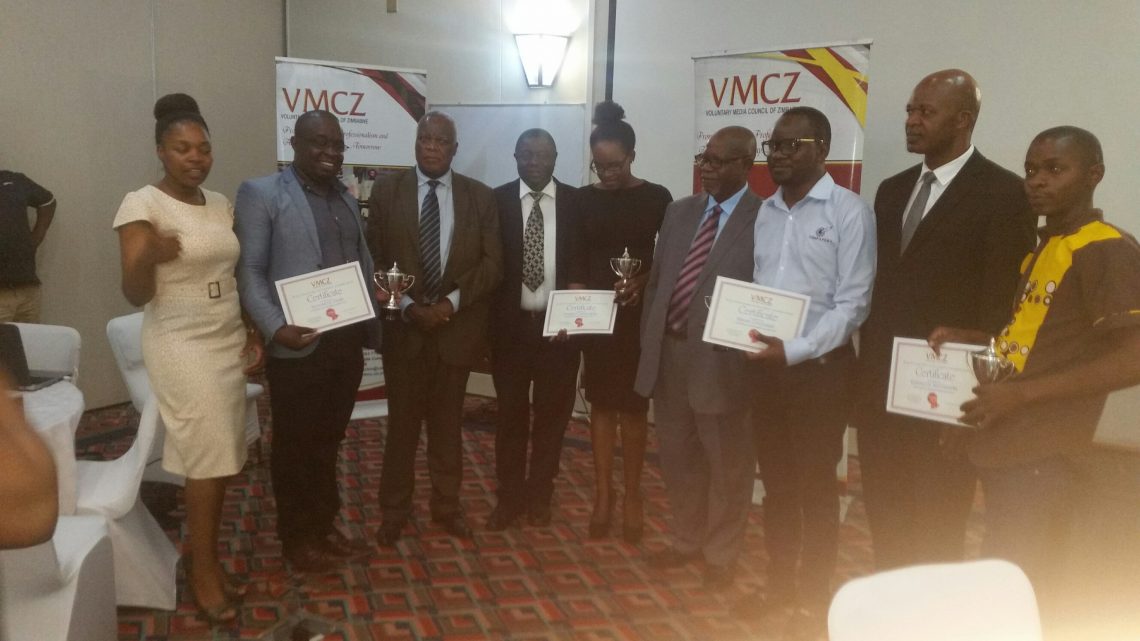By Byron Mutingwende
The awards by the Voluntary Media Council of Zimbabwe (VMCZ) seek to promote the highest ethical and professional standards as well as to recognise and celebrate excellence in journalism.
Speaking during the Media Professionalism and Investigative Journalism Awards ceremony held at Holiday Inn Hotel on 23 February 2018, Alec Muchadehama, the VMCZ Board Chairman said the occasion was to recognise, celebrate and incentivise excellence in journalism in line with the aspirational standards as set out in the VMCZ Media Code of Conduct.
The awards came at a time when the profession of journalism is facing unprecedented pressures, both internal and external, and both local and global.
“Journalism as we have always known it is also facing unprecedented pressures; from viability pressures induced by the explosion in digital journalism, shrinking budgets, misinformation and the so-called fake news phenomenon among the multiple, well-documented challenges,” Muchadehama said.
The 2017 Media Professionalism and Investigative Journalism awards theme was: “Promoting Media Professionalism and Sustainability.”
Geoffrey Nyarota, one of the pioneers of investigative journalism in independent Zimbabwe, who was the Guest of Honour at the awards, said adherence to professional journalism reinforces the credibility of media products.
“Credibility is a sine qua non of good journalism and of media sustainability, especially in an era when the media now operate under growing pressure and competition from new players such as the social media, which routinely dispense with professional or ethical practice,” Nyarota said.
The media guru said the awards were anchored on the sincere belief that media professionalism and investigative journalism were key to the survival and sustainability, as well as the continued relevance of the print media industry.
“In terms of the practice of professional journalism, independent Zimbabwe was fostered on a blend of an overdose of speech journalism and very limited investigative reporting. Meanwhile, corruption flourished, while those journalists who dared to challenge the system by investigating some of the many cases of epidemic corruption were dealt with ruthlessly. This happened both as punishment for them and as a deterrent among fellow journalists from any journalistic curiosity that sought to scrutinise and expose corruption among a powerful class of people who regarded themselves as untouchables,” Nyarota said.
He revealed that while pursuing serious investigative assignments, reporters working as individuals or in partnership with others, would delve deeply into a single subject of immense public interest.
Nyarota said whereas in speech reporting the subject will voluntarily make documents available to the reporter, the subject of an investigation, fearful of exposure, will usually make a concerted effort to conceal the information that the journalist seeks to unravel.
The veteran journalist said an element of risk is, therefore, always inherent in all serious investigative reporting. Corrupt officials who fear exposure and ruination will always seek to fight back.
He warned that the risk of litigation stands higher with investigative journalism and urged the journalists involved to be conversant with media laws, especially the laws of defamation.
“Ethical standards have, of necessity, to be taken into serious consideration as well. The need to ensure the veracity of information published is of paramount importance. There is no room in serious investigative journalism for meaningless claims such as, “At the time of going to press the subject was not picking up his mobile telephone.”
“To avoid serious repercussions for the newspaper after the story is published, the journalist should rather withhold his scoop from publication until the subject has finally picked up his phone and given his side of the story. In any case, such crucial input reinforces the credibility of the article and the reporter’s own reputation as a fair journalist.”
In terms of ethical journalism, the protection of confidential sources of information is of paramount importance. Institutionalised professional and ethical practice of journalism are key to the survival and sustainability of media organisations, as well as their continued relevance in an age of unprecedented competition and pressures. Investigative journalism and ethical practice of journalism serve to reinforce the credibility of media products.
The committee of adjudicators represented by Virginia Muwaningwa, acknowledged an improvement of output from the journalists. She urged journalists who walked away with the awards prizes to work harder so as to promote transparent societies by revealing ills like corruption that debilitate against sustainable development.
The nominees for the media professionalism category were Kenneth Matimaire, Regis Mhako, Vimbai Chinembiri and Byron Mutingwende. The winner was Chinembiri and Matimaire the runner-up.
In the investigative journalism awards, Vusimuzi Dube from Sunday News was the winner while Brian Chitemba from Sunday Mail was the runner-up.
